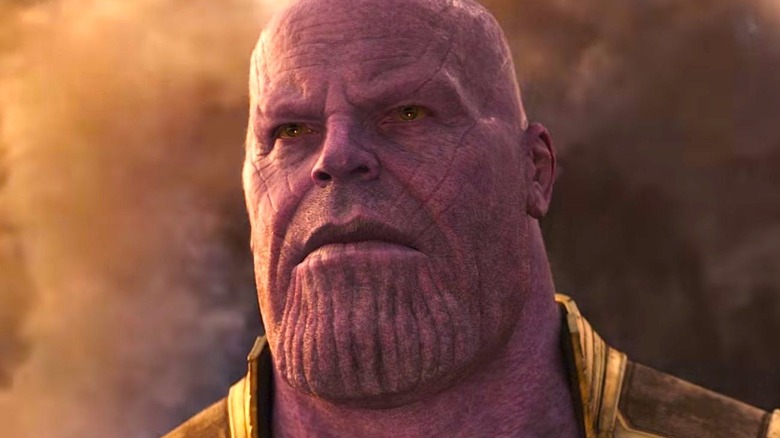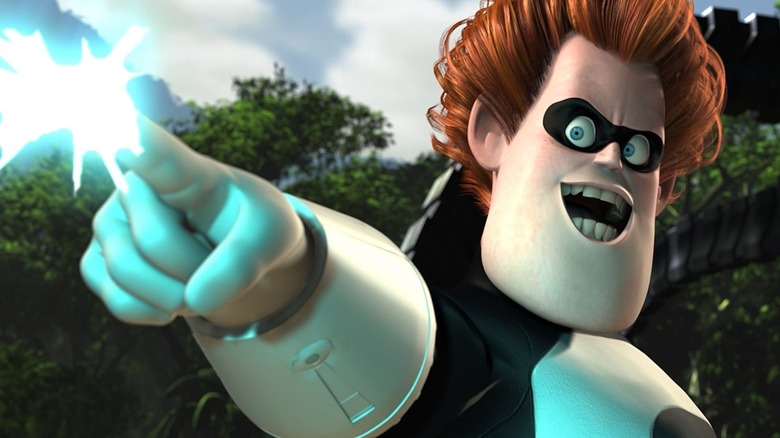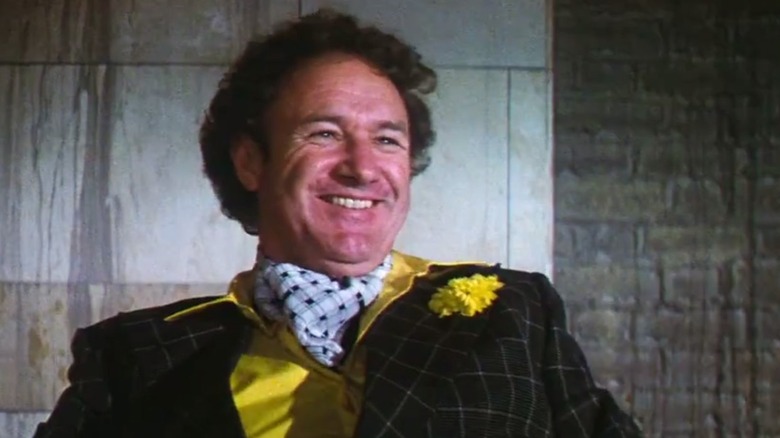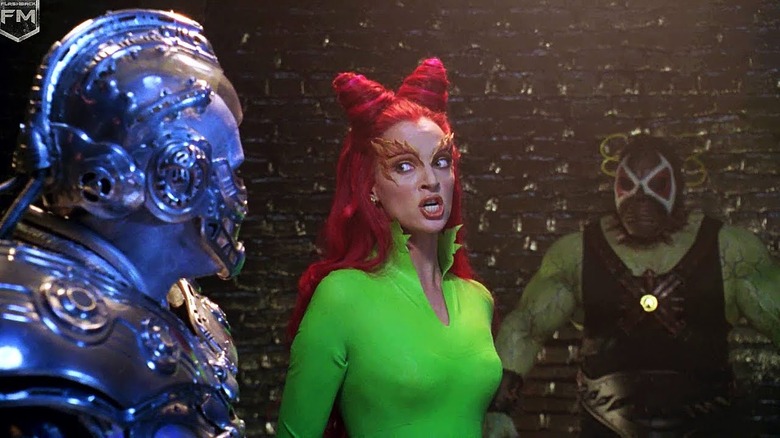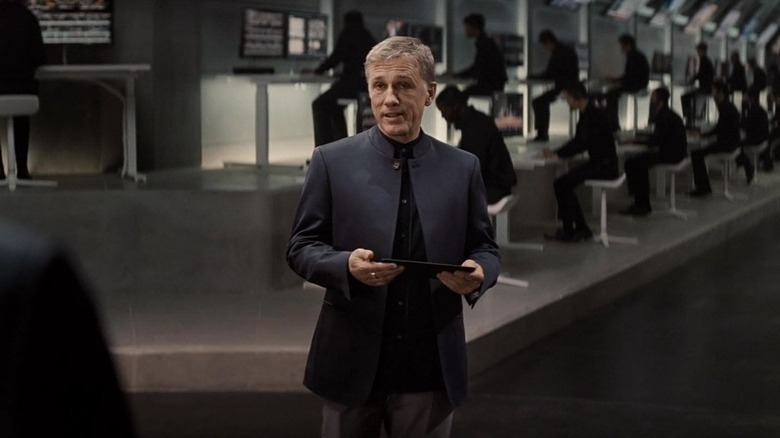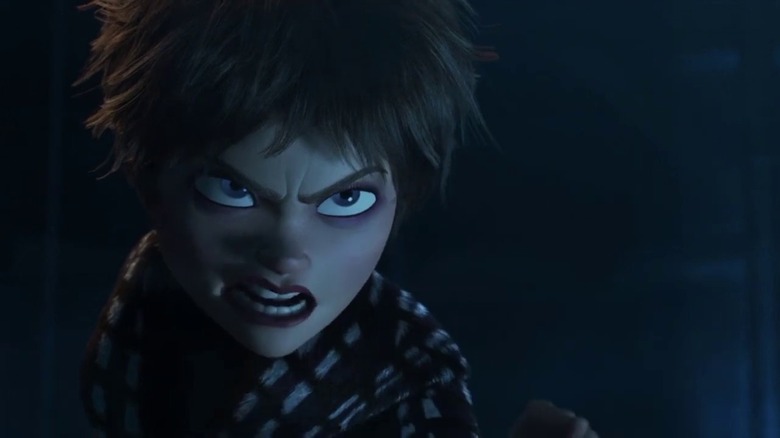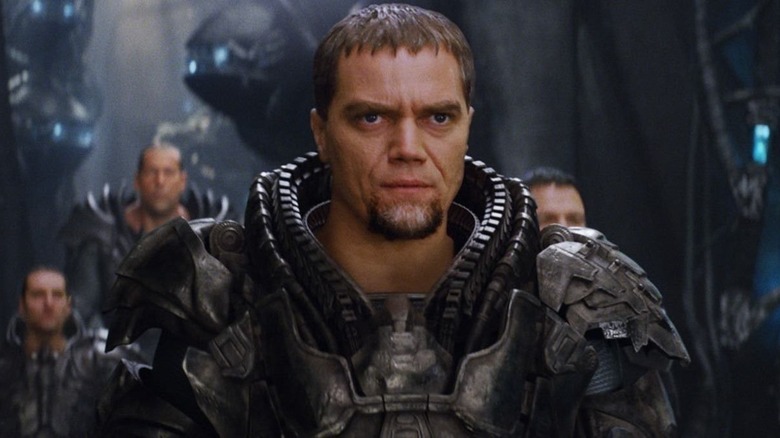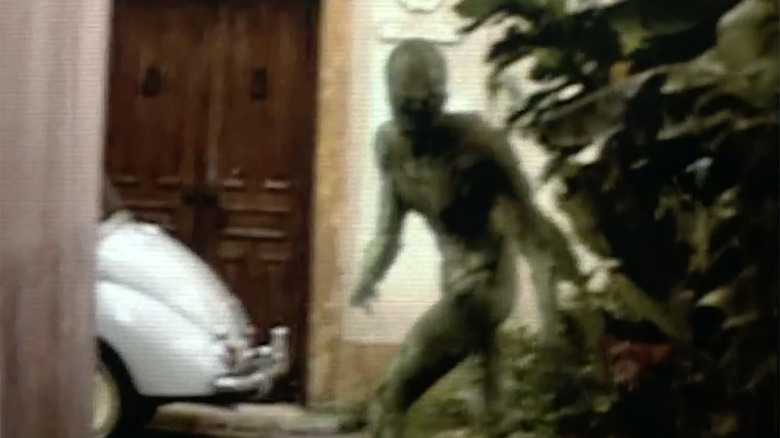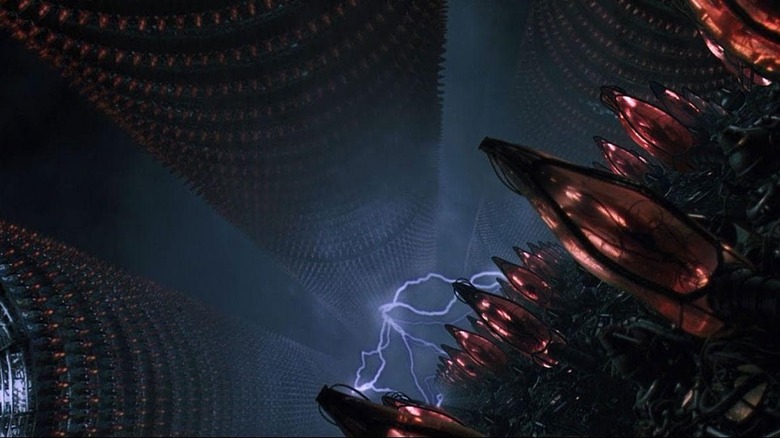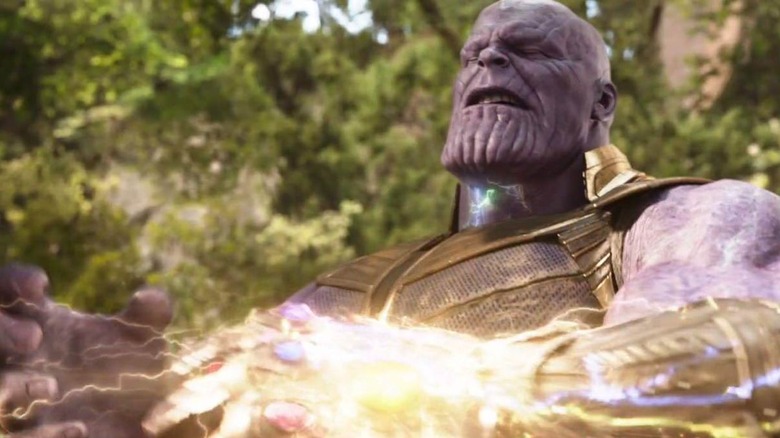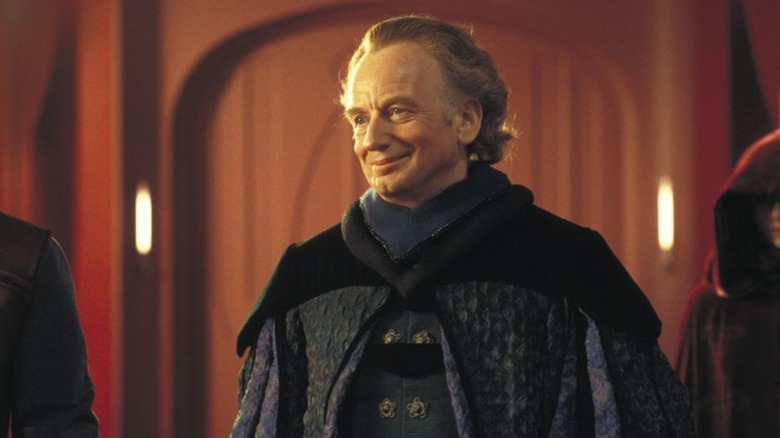The Worst Villain Plots In Movies
You can't have a hero without a villain. And if there's a villain, there's a dastardly plan the hero must put a stop to before everything they hold dear is lost. In some movies, the villain's plan is ingenious. Either they play the good guy until it's too late to stop them (Palpatine from the "Star Wars" prequels), they become experts at predicting the behavior of the good guys and make contingencies for every possible outcome (like the Joker in "The Dark Knight"), or they improvise and use misdirection to stay ahead of the hero (like Hans Gruber in "Die Hard.")
Unfortunately, plenty of movie villains, including those in films that are genuinely good, are notorious for dreaming up outrageous, convoluted, or simply nonsensical schemes that violate the logic the film set up for itself. Some of them might've worked if they'd put just a little more thought into them. Others are so outlandish it would've been better to start from scratch and come up with something — anything — less stupid. What are the worst villainous plans in movie history? Get ready to not be very scared. We've assembled them all right here.
Warning: spoilers ahead!
Syndrome wants to make everyone super in The Incredibles
In "The Incredibles," superheroes have been criminalized due to the collateral damage caused by their crime-fighting. This forces Bob Parr, aka Mr. Incredible, to conduct his day-saving in secret. He's eventually contacted by a mysterious agency that promises to finance his superheroics, but this is a ruse. Mr. Incredible eventually learns that the group is run by Syndrome, a bitter former fan of his whom he once rejected as a potential sidekick (because Syndrome, then "Incrediboy," was merely a kid at the time, lacking powers or anything but unstable homemade gadgets). To get revenge, Syndrome has been luring supers to his volcanic island for years and murdering them one by one.
After kidnapping Mr. Incredible, Syndrome reveals the rest of his dastardly plan: He'll attack Metroville with one of his own robots, the Omniodroid, and then sabotage it to make it look like he saved the day. Then, he'll use his newfound fame to sell his (now sophisticated) super technology to the public, so that, in his words, "when everyone's super, no one will be." Cue the evil laughter.
Okay, most bad villainous plans are nonsensical. This one checks out logically, we suppose, but it's still just plain dumb. Secretly controlling the villain to become a hero is interesting, but trying to eradicate superheroes by turning everyone into one is where it flies off the rails. It's hard to believe a guy this smart couldn't have thought of something less stupid.
Lex Luthor wants beachfront property in Superman
In the comics, Lex Luthor is a cold, calculating, and wealthy criminal genius who's often more than a match for his arch-nemesis, Superman. In the movies, however, the business magnate often comes up with ludicrously stupid schemes. In 2006's "Superman Returns," he plans to use nukes to replace the continental US with a new landmass, and then force everyone to live there. In "Batman v. Superman," Lex is obsessed with getting Superman and Batman to fight each other for reasons that aren't clearly explained.
But it's "Superman" itself that takes the cake for the stupidest Luthor scheme. The 1978 Christopher Reeve-fronted movie itself is fantastic, almost certainly the best Superman movie ever made. But Luther's villainous plot is straight schlock. In a nutshell, he wants to remotely hijack a nuclear missile that the U.S. military plans to launch from the American west coast as part of a test. He then wants to drop it right on the San Andreas fault to cause an earthquake that will split California from the mainland.
Why? Because Lex owns land in the Nevada desert and wants to increase its value by turning it into beachfront property. We're not kidding. Apparently, this billionaire genius didn't think of simply buying a property that was already on the coast, and avoiding the confrontation with Superman that was ultimately his undoing. It's one of the most famous dumb bad guy plans of all time. (Maybe that's why we love it).
Poison Ivy and Mr. Freeze's plans undermine each other in Batman & Robin
It almost feels like cheating to include a movie as bad as 1997's "Batman & Robin" on this list, but we can't talk about bad villain plans without bringing up the one found here. In fact, it's two villainous plans for the price of one. Victor Fries (Arnold Schwarzenegger), aka Mr. Freeze, who accidentally altered his own DNA in a botched experiment and now must live in a low-temperature suit to survive, wants to turn Gotham into ice so he can hold its residents for ransom and secure funding for his research. Typical comic book villainy here. When he's done, he plans to freeze the entire planet.
Then there's Poison Ivy (Uma Thurman). After learning that Bruce Wayne funded the scientist who tried to kill her, she turns to Mr. Freeze to defeat Batman and pave the way towards her own plan: covering the planet in massive plants, after Freeze's freeze kills everyone but them.
One small problem: plants don't grow well in arctic environments. It would be one thing if they merely teamed up to defeat their mutual foe, Batman, before turning on each other, or if Freeze's planned ice age was temporary (it's not). But they both seem genuinely excited about their scheme despite the fact that it is completely impossible to pull off, even without the titular heroes standing in their way.
Skynet could've sent the Terminators back further in Terminator
In the "Terminator" franchise, a malevolent AI known as Skynet fights its human creators in a war for global control. Later entries show the war directly, but the first few movies usually involve Skynet sending the titular unstoppable death machines back in time to assassinate Sarah Connor and her son John, in a bid to prevent the resistance movement he would one day lead. It's a pretty solid sci-fi concept.
Unfortunately, Skynet's scheme is not without holes. As evidenced by the existence of multiple sequels, this plan fails repeatedly. Somehow the Connors always manage to evade the Terminators, which become increasingly dangerous but never more successful. In "The Terminator," the T-800 (Arnold Schwarzenegger) is defeated by a hydraulic press. In "T2: Judgement Day," the T-1000 (Robert Patrick) is hit with a grenade launcher and thrown into a vat of molten steel. In "Terminator 3: Rise of the Machines," the T-X (Kristanna Loken) is blown up with a hydrogen fuel cell. Do you see the pattern here? These things might be hard to kill, but they're still vulnerable to modern technology.
Skynet could've avoided all this hassle by either sending multiple Terminators or targeting Sarah Connor's great-great-grandparents, who certainly lived when technology wasn't nearly as advanced. If Skynet could figure out time travel and build machines like this in the first place, it could certainly figure out which cowboy to target to prevent Sarah and John's future births.
Blofeld's plan assumes James Bond would become a spy in 007: Spectre
Ernst Blofield, who's appeared in several James Bond movies and who's the chief inspiration behind Dr. Evil from the "Austin Powers" films, is the Bond villain. Which of course means he's prone to outrageous, trope-y bad guy silliness that borders on comedy. He monologues to captured foes, laughs maniacally while stroking a cat, has a shaved head and scarred face, and, of course, revels in coming up with ludicrous plans.
The Daniel Craig-fronted "007" films are often considered to be more serious than their predecessors, but they also house the dumbest Blofeld plot ever in 2007's "Spectre." In this movie, it's revealed that Blofeld was originally named Franz Oberhauser, whose father adopted a young James Bond after he was orphaned. Jealous of his father's love for Bond, Oberhauser killed him, faked his own death, and re-emerged as Ernst Blofeld, criminal mastermind. Blofeld then made it his life's singular mission to torment Bond, including with the titular criminal organization seen in this film.
Okay, let's stop here. Putting aside the fact that childhood jealousy is a distractingly weak motivation for villainy on this scale, Blofeld apparently started building his criminal empire well before he knew that Bond would eventually become a superspy. How did he know that's the path Bond would take? What would he have done if Bond ended up in accounting, or fixing cars? It just doesn't make sense.
Evelyn Deavor wants to legalize superheroes so she can criminalize them again in Incredibles 2
In "The Incredibles," we learn that the destruction wrought by superheroes led to their being outlawed. In the sequel, the wealthy Deavor siblings approach Bob and Helen Parr with a plan to legalize supers like them once more. By staging controlled crises around town and having the Incredibles save the day, they hope to increase support for their return.
Eventually, though, we learn that only one sibling, Winston (Bob Odenkirk) was ever genuinely on board, as he blames the lack of superheroes for the death of his parents. His sister Evelyn (Catherine Keener), however, is a different story. She mistakenly blames the existence of heroes for this childhood tragedy, and now plans to brainwash superheroes into attacking a summit in which assembled world leaders will officially re-legalize them. This, she hopes, will lead to superheroes being permanently distrusted and criminalized.
The biggest issue here is the fact that before she and her brother got involved, superheroes were already illegal. It would've been one thing if her brother was going ahead with the plan with or without her, and her only option was to sit it out or sabotage it from within. But it's made perfectly clear that she played a huge role in making their superhero re-legalization scheme successful in the first place. If she wanted supers to be illegal, she should've done nothing. Instead, her defeat leads to widespread support for heroes.
General Zod wants to terraform earth for Kryptonians who can already live on it in Man of Steel
"Man of Steel" was a rocky start to a rocky DCEU. It wasn't without its moments though, the most important of which was Henry Cavill's excellent turn as Superman. Michael Shannon also did an admirable job as General Zod, another Kryptonian who survived that planet's destruction at the beginning of the movie. Unfortunately, he was undermined by a questionable plot (to say nothing of the haircut).
In the movie, Zod and his fanatical henchman escape the Phantom Zone, where they'd been imprisoned for treason against Krypton, and head to earth to terraform it into a new Krypton using massive devices recovered from Kryptonian outposts along the way. When they arrive, they wreak untold havoc in Metropolis and present Superman with his first great challenge, which ends, controversially, with Superman killing Zod.
But here's the problem: Superman himself is proof that Kryptonians can survive just fine on earth as it is. In fact, they can do more than just survive, they thrive, having acquired godlike powers from the sun. It makes sense to terraform a lifeless planet into one with breathable air and fertile soil. But earth already has those things. It would be another thing for Zod to want to wipe out humanity so Kryptonians could colonize the planet, but he specifically wants to terraform it and merely doesn't care who gets killed during that process. Maybe Zod left his critical thinking skills in the Phantom Zone.
Hydrophobic aliens invade a planet covered in water in Signs
"The Sixth Sense" and "Unbreakable" established director M. Night Shyamalan as perhaps the filmmaking talent to watch going into the 21st century. We all know how that turned out: with widely panned schlock like "The Happening," "The Last Airbender," and "After Earth" torpedoing his once-proud legacy. But in 2002, he was still riding high. That's the year he released "Signs," an alien movie starring Mel Gibson as Graham Hess, a grieving priest trying to hide his family from extraterrestrial invaders after his wife's death. The movie is pretty good, overall, but we have some serious questions about those aliens.
Shyamalan is of course known for twist endings as much as anything else. The big head-spinner in this one was the fact that the glasses of water Hess' daughter Bo had placed in high places around the house, much to his irritation, were actually there for a reason. When aliens do break into the house, we learn they're deathly vulnerable to water, thus turning the Hess rancher into a death trap.
Okay, so we're supposed to believe that aliens who are violently averse to water would've landed on a planet with 75% of its surface covered in the stuff... naked? These aren't mindless creatures. They mastered interstellar travel, which is a whole lot more than you can say about humans. But at least we're smart enough to put on suits and do research before landing in strange environments.
The Machines could've set the Matrix earlier than 1999 in The Matrix
In the world of "The Matrix," humanity blotted out the Sun to deprive their solar-powered Machine enemies, with whom they were fighting a losing war, of an energy source. So the Machines decided to use human bodies as batteries instead. To placate us, they created the titular Matrix: a vast simulated reality for our imprisoned minds, set at the end of the 20th century. That way, humans could live in blissful ignorance while Machines used them for energy. If you think about it, everyone wins.
Unfortunately, the Machines made a critical mistake by setting the Matrix in 1999, for one simple reason: humans had computers and the internet then. And Neo, a hacker, used both to break free of the Matrix and ultimately threaten the Machines' entire plan. Now to be fair, at the end of "Matrix: Revolutions," he and the Machines end up striking a bargain in which the Matrix will endure and the Machines will stop prosecuting their war against humanity, in exchange for Neo dealing with Agent Smith. But the Machines didn't know how that would play out. When he was first freed, Neo had every intention of destroying the Matrix and liberating everyone trapped inside. The Machines controlled everything about the simulation. Simply setting it a decade earlier, or otherwise preventing the invention of the internet, would've deprived Neo of the computing tools he needed to even get close to his goal.
Thanos could've used the Infinity Stones to feed everyone in Infinity War
Many of the MCU's major developments leading up to the reveal of Thanos dealt with the Infinity Stones, which ultimately played a central role in his plan. Put simply, he sought to collect them all on his Infinity Gauntlet and snap his fingers to eradicate half of all life in the universe, thus reducing ever-growing demand on finite resources. He truly does believe he's doing everyone who survives a favor. In reality, of course, he's a deranged monster who must be stopped.
He's also a bit of an idiot. Now listen, we understand he's called the Mad Titan for a reason. But his plan doesn't even follow its own internal logic. Let's put aside the fact that devastated populations will eventually recover, thus rendering his extreme solution to widespread hunger a temporary one. Thing is, snapping your fingers with all assembled Infinity Stones on that hand grants you any single wish you want. If Thanos really wants to save the universe from starvation, why not just wish for twice as much food, or maybe wish that there will always be abundant resources regardless of how many beings exist? Or maybe wish that beings didn't need to eat at all? Every conceivable solution to this problem was literally at his fingertips. He chose the dumbest, least effective one possible. Not to mention one that made his job harder, as it ensured he'd be opposed by the Avengers.
Palpatine constantly undermines his own plans in The Phantom Menace
Emperor Palpatine's prequel trilogy plan to seize dictatorial power in the Republic by starting a war and playing both sides was largely brilliant (and terrifyingly realistic).
But the initial steps of this plan, seen in 1999's "The Phantom Menace," are a lot more questionable. In a nutshell, he wants to manufacture a trade dispute on his home planet of Naboo to drum up sympathy for himself. Then he'll covertly undermine government efforts to resolve the crisis. This will reflect poorly on then-Chancellor Valorum, who he will replace as Chancellor following a no-confidence vote (exciting material for a kid's movie, George). So far, so good.
But the devil's in the details. Why did he go to such lengths to keep his scheme a secret? If he'd succeeded in killing the Jedi who went to investigate the Trade Federation blockade of Naboo, news of the crisis that catapulted him to power never would've reached the Senate. Secondly, his plan to force Queen Amidala to sign a treaty would've ended the crisis and thus removed the need for a no-confidence vote, which would've foiled his plan. Lastly, once open war breaks out, he constantly instructs his forces to do the wrong thing, like abandoning a secure position in the city in order to deal with an obvious diversion in the middle of nowhere.
Palpatine would eventually become a fearsome tyrant, but in the beginning, he was his own worst enemy.
